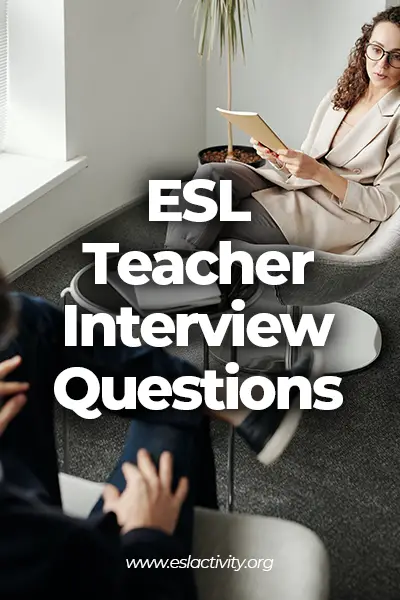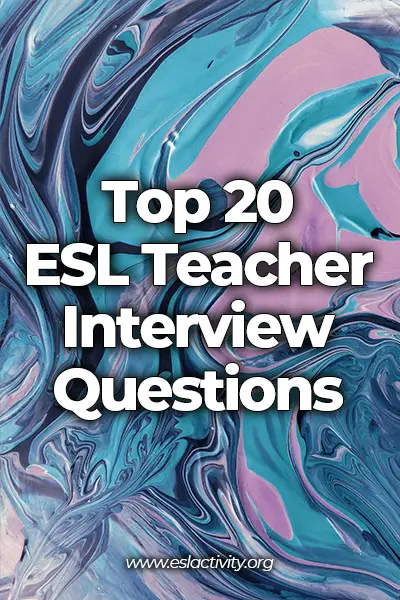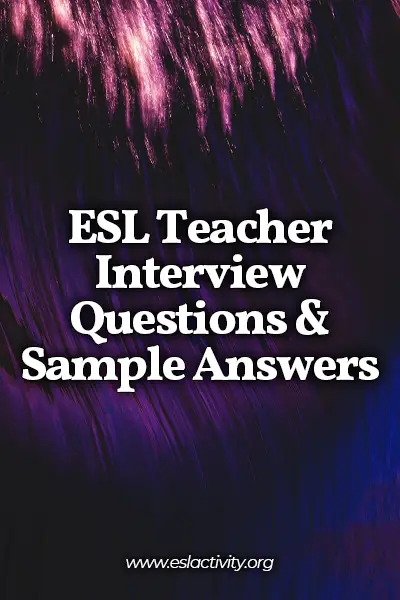If you are an ESL teacher looking for an English teacher job, you’ll have to go through interviews. In this article, we’ll delve into the top 20 most common interview questions for an English teacher job and equip you with strategies to craft good responses that leave a lasting impression.

ESL Teacher Interview Questions
ESL Teacher Interview Process
The specifics of the hiring process will differ depending on the country, institution, and type of job. Still, you can go over the following steps to understand what the general ESL teacher hiring process looks like. No hiring process is the exact same. So you can expect this list to be shorter or longer for every ESL teaching job.
- Application submission
- Screening
- Initial interview
- Teaching demonstration
- Language proficiency assessment
- Second interview
- Reference check
- Background check
- Contract negotiation
- Orientation and training
- Work visa processing
- Onboarding
ESL Teacher Interview Questions
Following are some of the most common interview questions for ESL teachers. We’ve included tips on answering each of the questions and sample answers as well. As you prepare for your English teacher job interview, remember that each response is an opportunity to showcase your expertise and commitment. Practice, articulate confidently, and let your passion for education shine through. Best of luck on your journey to securing that dream teaching position!
1. Tell Us About Yourself
Begin on a strong note by summarizing your professional journey concisely. Highlight relevant teaching experience, education, and your passion for English language education. Avoid personal details. Focus on professional achievements and experiences.
Sample Answer: “I am an enthusiastic and dedicated English teacher with [X years] of experience. My journey in education began at [Previous School], where I honed my skills in fostering a positive learning environment and implementing engaging teaching methods.”
2. What Teaching Methods Do You Employ?
Discuss innovative approaches such as project-based learning, differentiated instruction, and incorporating technology to engage students actively. If possible, don’t stick to one method. Showcase flexibility and willingness to adapt.
Sample Answer: “I utilize a combination of project-based learning and interactive activities to keep students engaged. Incorporating technology is a key aspect, allowing for a dynamic and modern approach to language education.”
3. How Do You Adapt Your Teaching Style to Different Learning Levels?
Showcase your adaptability by emphasizing your ability to tailor lessons to cater to diverse learning needs within a classroom. Avoid generic responses. Provide specific examples from your teaching experience.
Sample Answer: “I differentiate instruction by assessing students’ learning styles and tailoring lessons accordingly. This ensures that each student, regardless of their level, receives personalized support.”
4. Share an Example of a Successful Lesson Plan
Illustrate your lesson plan by narrating a specific lesson’s success, emphasizing student engagement and measurable outcomes. Avoid overloading with details. Focus on key elements and outcomes.
Sample Answer: “One successful lesson involved analyzing a short story. By incorporating group discussions, multimedia resources, and a creative writing task, students not only grasped the content but also developed critical thinking skills.”
5. How Do You Foster a Positive Learning Environment?
Highlight your commitment to creating a supportive and inclusive atmosphere that encourages student participation and mutual respect.
Sample Answer: “I foster positivity through clear communication, mutual respect, and creating a classroom culture where each student feels valued. Incorporating humor and encouraging open dialogue also contribute to a positive atmosphere.”
6. What Role Does Technology Play in Your Teaching?
Emphasize your tech-savvy side, discussing how you integrate educational tools and online resources to enhance the learning experience. Avoid relying solely on technology. Highlight its supplementary role.
Sample Answer: “I integrate technology to enhance lessons and make them more interactive. Platforms like [specific tool] allow students to access additional resources, and I use multimedia presentations to cater to diverse learning styles.”
7. Describe Your Approach to Handling Classroom Behavior Issues
Demonstrate your classroom management skills by outlining a proactive approach to addressing and resolving behavior challenges. Don’t downplay the significance of addressing behavior issues promptly.
Sample Answer: “I address behavior issues proactively by establishing clear expectations and consequences. Positive reinforcement, individual conferences, and involving parents when necessary contribute to a well-managed classroom.”
8. How Do You Assess Student Progress?
Discuss a variety of assessment methods, including formative and summative assessments, to showcase your commitment to comprehensive student evaluation. Avoid relying solely on traditional exams. Emphasize a holistic approach.
Sample Answer: “I employ a variety of assessments, including formative and summative evaluations. Continuous feedback, quizzes, and project assessments help me gauge individual progress and adjust teaching strategies accordingly.”
9. What’s Your Strategy for Differentiating Instruction?
Highlight your ability to cater to diverse student needs by explaining how you modify lessons to accommodate various learning styles and abilities.
Sample Answer: “Understanding diverse learning styles, I differentiate instruction by incorporating visual aids, hands-on activities, and offering alternative assignments. This ensures every student can grasp the material effectively.”
10. How Do You Stay Updated on Education Trends?
Show your dedication to professional growth by mentioning memberships in professional organizations, attending conferences, or engaging in continuous professional development. Avoid complacency. Demonstrate a commitment to ongoing learning.
Sample Answer: “I stay informed through memberships in professional organizations, attending conferences, and participating in online courses. Continuous professional development is crucial for delivering the latest and most effective teaching methods.”

11. Share Your Experience with Inclusive Education
Discuss your experience fostering an inclusive classroom environment, accommodating students with diverse learning needs and abilities.
Sample Answer: “I have experience creating an inclusive environment for diverse learners, including those with special needs. Adapting materials, providing additional support, and collaborating with special education staff ensure that every student can thrive.”
12. What Motivates You as an English Teacher?
Reveal your passion for education by sharing personal motivations and connections to the subject matter.
Sample Answer: “My motivation stems from witnessing students’ growth, both academically and personally. Knowing that I contribute to their language development and critical thinking skills keeps me passionate about teaching.”
You may also encounter questions about student motivation. Here are a few ideas for this topic: Increasing English Learner Motivation.
13. How Do You Encourage Critical Thinking in Your Students?
Discuss strategies for promoting critical thinking skills, such as open-ended discussions, analysis, and real-world applications.
Sample Answer: “I foster critical thinking through open-ended discussions, analyzing literature, and real-world applications of language skills. Encouraging students to question, analyze, and express their opinions contributes to their overall development.”
14. Describe a Challenge You Faced in Teaching and How You Overcame It
Show resilience by narrating a specific challenge, detailing the steps taken to address it, and reflecting on the positive outcomes. Avoid overemphasizing the challenge. Focus on the solution and positive outcome.
Sample Answer: “One challenge was addressing varying language proficiency levels in one class. I implemented differentiated instruction, utilized peer-assisted learning, and provided extra resources, resulting in improved outcomes for all students.”
15. How Do You Engage Parents in the Learning Process?
Highlight your commitment to fostering a strong teacher-parent partnership by discussing communication strategies, parent-teacher conferences, and progress updates.
Sample Answer: “I engage parents through regular communication, parent-teacher conferences, and involving them in classroom activities. Keeping them informed about their child’s progress fosters a collaborative learning environment.”
16. Share Your Philosophy on Homework
Discuss the purpose of homework, emphasizing its role in reinforcing learning objectives and promoting independent study habits. Avoid assigning homework without clear educational objectives.
Sample Answer: “Homework serves as a reinforcement tool. Assignments are purposeful, aligning with lesson objectives, and promote independent study. I believe it should enhance learning without becoming burdensome.”
17. How Do You Handle Disagreements with Colleagues?
Demonstrate your interpersonal skills by discussing your approach to resolving conflicts professionally and maintaining a positive working environment. Don’t avoid conflicts. Show your ability to handle disagreements maturely.
Sample Answer: “I approach disagreements professionally, initiating open communication and seeking common ground. Respecting diverse perspectives and finding collaborative solutions contributes to a positive work environment.”
18. What’s Your Experience with ESL (English as a Second Language) Teaching?
Highlight any experience or training related to ESL education, showcasing your ability to support non-native English speakers effectively.
Sample Answer: “I have significant experience in ESL teaching, adapting materials for non-native English speakers, providing language support, and creating an inclusive environment that addresses diverse linguistic backgrounds.”
19. How Would You Contribute to Extracurricular Activities?
Express your commitment to the overall school community by discussing your willingness to contribute to clubs, events, or other extracurricular activities.
Sample Answer: “I am committed to the overall school community. I would contribute by volunteering for language-related clubs, organizing language-themed events, and supporting students’ participation in language-related extracurriculars.”
20. Why Should We Hire You?
Summarize your unique qualifications, emphasizing how your skills, experience, and passion align seamlessly with the institution’s values and educational goals. Tailor your answer to the specific needs of the institution.
Sample Answer: “With my passion for English education, extensive experience, and commitment to creating an engaging and inclusive learning environment, I bring a unique set of skills that align perfectly with the school’s values and educational goals.”

FAQs About ESL Teacher Interview Questions
Here are some of the most frequently asked questions about ESL teacher interview questions and answers.
How do I prepare for an ESL interview?
Here are some tips for preparing for an ESL interview.
- Research the school or institution.
- Read the job description and understand the position.
- Know your audience and prepare answers that are relevant to the age group that people in the position will be teaching.
- Review common ESL teaching strategies.
- Prepare lesson examples.
- Prepare classroom management questions.
- Discuss technology integration.
- Review your resume.
- Practice common ESL teacher interview questions and answers.
- Prepare questions to ask at the end of the interview.
How do I answer the “Why should we hire you as an ESL teacher” interview question?
When you answer the “Why should we hire you as an ESL teacher” question, try to highlight relevant qualifications, emphasize your teaching experience, and address your passion. Here’s a sample answer to the question: “I am the ideal ESL teacher candidate for [School Name] due to my [Your Degree] in [Your Major] and ESL certification, along with [X years] of experience in dynamic ESL environments. My passion for fostering language development is evident in my innovative teaching methods, creating inclusive classrooms. I am excited about contributing to [School Name] by bringing adaptability, enthusiasm, and a commitment to ongoing professional development.”
How do you introduce yourself in an ESL interview?
In an ESL interview, introducing yourself is an opportunity to make a positive first impression. Keep your introduction concise and focused on relevant information. Include your education, experience, and passion for teaching. You can also include a personal touch to your introduction by including one of your hobbies or interests related to education.
What is the best answer to the “Why do you want to be a teacher” question?
The best answer to the “Why do you want to be a teacher?” question is one that authentically conveys your passion for education, your commitment to making a positive impact on students’ lives, and your enthusiasm for the learning process. Here’s an example: “I aspire to be a teacher because I see education as the beacon that illuminates the path to individual growth and societal progress. As a lifelong learner myself, I am captivated by the idea of igniting that spark of curiosity and knowledge in others. The classroom, for me, is not just a space for academic instruction; it’s a dynamic arena where mentorship, empathy, and inspiration converge. I am drawn to the prospect of being not just a provider of information but a catalyst for self-discovery and empowerment. Teaching, to me, is an art—a delicate blend of fostering critical thinking, nurturing creativity, and instilling a lifelong love for learning. It’s the canvas upon which the future is painted, and I am eager to contribute my passion and dedication to shaping that canvas positively.”
What are some sample teacher interview questions?
Here’s a list of sample teacher interview questions:
- Tell us about yourself.
- What inspired you to become a teacher?
- How do you adapt your teaching style to accommodate different learning styles in the classroom?
- Describe a successful lesson plan you have implemented.
- How do you handle classroom behavior issues?
- What role does technology play in your teaching?
- How do you assess student progress and performance?
- What strategies do you use to differentiate instruction for diverse learners?
- How do you create an inclusive and positive learning environment?
- What motivates you as a teacher?
- How do you stay updated on current educational trends and best practices?
- Can you share an experience where you successfully collaborated with colleagues or parents?
- How do you foster critical thinking skills in your students?
- What is your approach to homework assignments?
- How do you handle disagreements or conflicts with colleagues or administrators?
- What experience do you have with English as a Second Language (ESL) teaching?
- How would you contribute to extracurricular activities or school events?
- Describe a challenging situation in teaching and how you overcame it.
- What is your philosophy on classroom management?
- Why do you want to work at this particular school?
What are good questions to ask at the end of a teaching interview?
Here are some good questions to ask the interviewer:
- What professional development opportunities are available for teachers at this school?
- Can you describe the school’s approach to technology integration in the classroom?
- How does the school support the social and emotional well-being of both students and teachers?
- What is the collaboration and communication like among the teaching staff?
- Can you tell me more about the school’s extracurricular activities and clubs?
- How are parents involved in their child’s education, and what communication channels are in place?
- What is the school’s approach to diversity, equity, and inclusion?
- How is student success measured and supported at this school?
- What kind of professional development or support is provided for teachers working with English Language Learners (ELLs) or students with special needs?
- Can you share more about the curriculum development process and teacher input in shaping it?
- What opportunities are there for teachers to take on leadership roles within the school?
- How is feedback provided to teachers to support their continuous improvement?
- What resources are available to teachers to enhance their teaching practices?
- How does the school handle parent-teacher conferences and communication about student progress?
- What can you tell me about the school’s community involvement and partnerships?
ESL Teaching Jobs
Here are some information on ESL teaching jobs available around the world.
- Top 10 Countries to Consider for Working Abroad
- Top 6 Countries for Volunteer ESL Teaching Abroad
- Teaching English in Norway
- Teach English in Dubai
- What is an Eikaiwa? Jobs, Teaching in Japan, Salary & More
ESL Teacher Interview Questions: Join the Conversation
Did you find these sample ESL teacher interview questions helpful? The interview is one of the most critical stages of the recruitment process. Make sure to practice answering the sample questions and be prepared.




